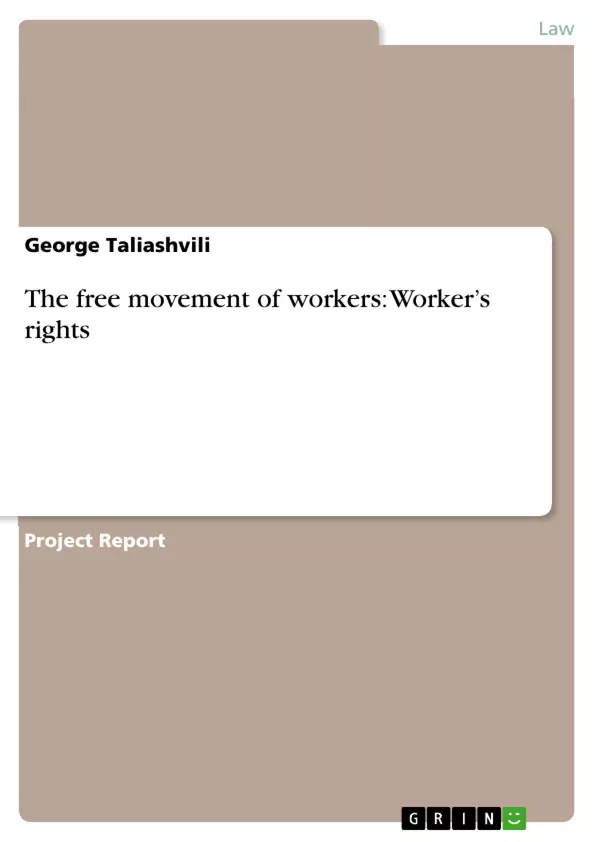Preview
My homework aims to elucidate the principles of free movement of workers and to give a small review on the provisions of EC treaty concerning to the worker’s rights and some exceptions regarding the freedom.
After the world war two the Europe was periled: it was disjointed, the economies of majority European countries were devastated and the contravention of the equipoise in Europe menaced it to face the upcoming economical and political catastrophes in region, the situation acquired immediate handicapping, betimes the idea how to resolve problems and the remedy of the situation arose in Sir Winston Churchill’s words: “Recreate the European Family or as much of it as we can and provide it with a structure under which it can dwell in peace in safety and in freedom. We must build a kind of United States of Europe” and this words stimulated the main European countries to establish the “European United States” another “land of opportunity”, without borders and with much more opportunities and capacity to achieve a better life. In 1957 was signed the Treaty of Rome which laid the essential legal foundations for European Committee.
After the establishing the European Committee its main tasks regarded to the achieving the high point of standard of living and economical expansion, for further development of mentioned tasks the Internal Market was subsisted by the EC treaty provisions which was the incarnation of Sir Winston Churchill’s idea and significant tool of economic integration, no boarders, no custom duties and the abolition of barriers to the free movement of goods, services, workers and capital within the member states known as the ‘four freedoms’, was the great step towards the European consolidation.
Inhaltsverzeichnis (Table of Contents)
- The evolution and the brief history of the principle: ‘free movement of workers’
- The General definition of free movement of workers
- Persons considered as the Worker.
- Rights granted to the Workers.
- Exceptions...
- Conclusion
Zielsetzung und Themenschwerpunkte (Objectives and Key Themes)
This work aims to explain the principles of free movement of workers and provide a brief overview of the European Community Treaty provisions concerning worker's rights, including certain exceptions to this freedom.
- The historical development of the principle of free movement of workers
- The legal framework for the free movement of workers within the European Community
- The definition of a "worker" within the context of free movement
- The rights granted to workers under the free movement provisions
- The exceptions to the free movement of workers provisions
Zusammenfassung der Kapitel (Chapter Summaries)
The first chapter explores the historical development of the principle of free movement of workers, starting with the aftermath of World War II and the European Union’s formation. It highlights the Treaty of Rome's role in establishing the European Economic Community and its focus on economic integration, including the "four freedoms."
The second chapter provides a detailed analysis of the free movement of workers, one of the "four freedoms" crucial to the Internal Market. It breaks down the principle into its three key elements: the right to move and reside in another member state, the right to access that state's job market, and the right to move with family members. It also examines the relevant articles in the EC Treaty (Articles 39-42) and how they've been expanded through secondary legislation and court decisions.
The third chapter delves into the definition of a "worker" in the context of free movement. It notes that the treaty and secondary legislation lack a clear definition, leading to the concept evolving through court cases. Two main interpretations of "worker" are discussed: a formal aspect and an economic aspect. The chapter then examines key legal decisions, including Lawrie-blum vs Land Baden Wurttemberg, which provide further insights into the definition of "worker."
Schlüsselwörter (Keywords)
The key concepts and themes explored in this work include free movement of workers, European Union, Treaty of Rome, Internal Market, "four freedoms," worker's rights, exceptions to free movement, case law, and the definition of "worker."
Frequently Asked Questions
What is the principle of free movement of workers?
It is one of the 'four freedoms' of the European Internal Market, allowing EU citizens to move to, reside in, and work in any member state without discrimination based on nationality.
Which articles of the EC Treaty govern the free movement of workers?
The primary legal foundations are found in Articles 39 to 42 of the EC Treaty (now Articles 45-48 TFEU), which mandate the abolition of any discrimination between workers of the Member States.
How is a "worker" defined in EU law?
There is no single statutory definition; instead, the concept has evolved through European Court of Justice (ECJ) case law. A worker is generally someone who performs services for another under direction in return for remuneration.
What rights are granted to workers moving within the EU?
Workers have the right to accept offers of employment, move freely for this purpose, stay in a member state for employment, and remain there after having been employed. They also enjoy equal treatment regarding social and tax advantages.
Are there exceptions to the free movement of workers?
Yes, limitations can be justified on grounds of public policy, public security, or public health. Additionally, certain positions in the public service are exempt from these provisions.
What was the significance of the Lawrie-Blum case?
The Lawrie-Blum vs. Land Baden-Württemberg case provided a key interpretation of the term 'worker,' confirming that even a trainee teacher performing services under supervision for pay qualifies as a worker under EU law.
- Quote paper
- George Taliashvili (Author), 2008, The free movement of workers: Worker’s rights, Munich, GRIN Verlag, https://www.grin.com/document/93931



